No dog breed is the right fit for everyone, and this definitely includes the German Shorthaired Pointer. These dogs are active, large, and expensive.
The most common complaint about German Shorthaired Pointers is that they require too much time. They need plenty of physical exercise, mental enrichment, and one-on-one time with you. These dogs can be difficult to keep up with if you’re not an active person.
In this article, we’ll explore this and other common complaints about the breed.
Are German Shorthaired Pointers Good Dogs?
German Shorthaired Pointers aren’t bad dogs by any means! Before we dive into their faults, let’s explore some good things about the breed.
They’re incredibly loyal dogs who tend to do good with families so long as they’re well-trained and supervised around children. They’re affectionate, friendly, and good-natured.
GSPs are people pleasers, which makes training easy so long as you know what you’re doing. They’re high-energy, working dogs who thrive with active people who have time to spend with them.
Of course, all of their attributes can also be drawbacks depending on your point of view. Every dog breed is the perfect fit for some people and terrible for others!
Let’s get into 15 reasons a German Shorthaired Pointer may be the wrong dog for you.
Common Complaints About German Shorthaired Pointers
#1: They Can be Destructive
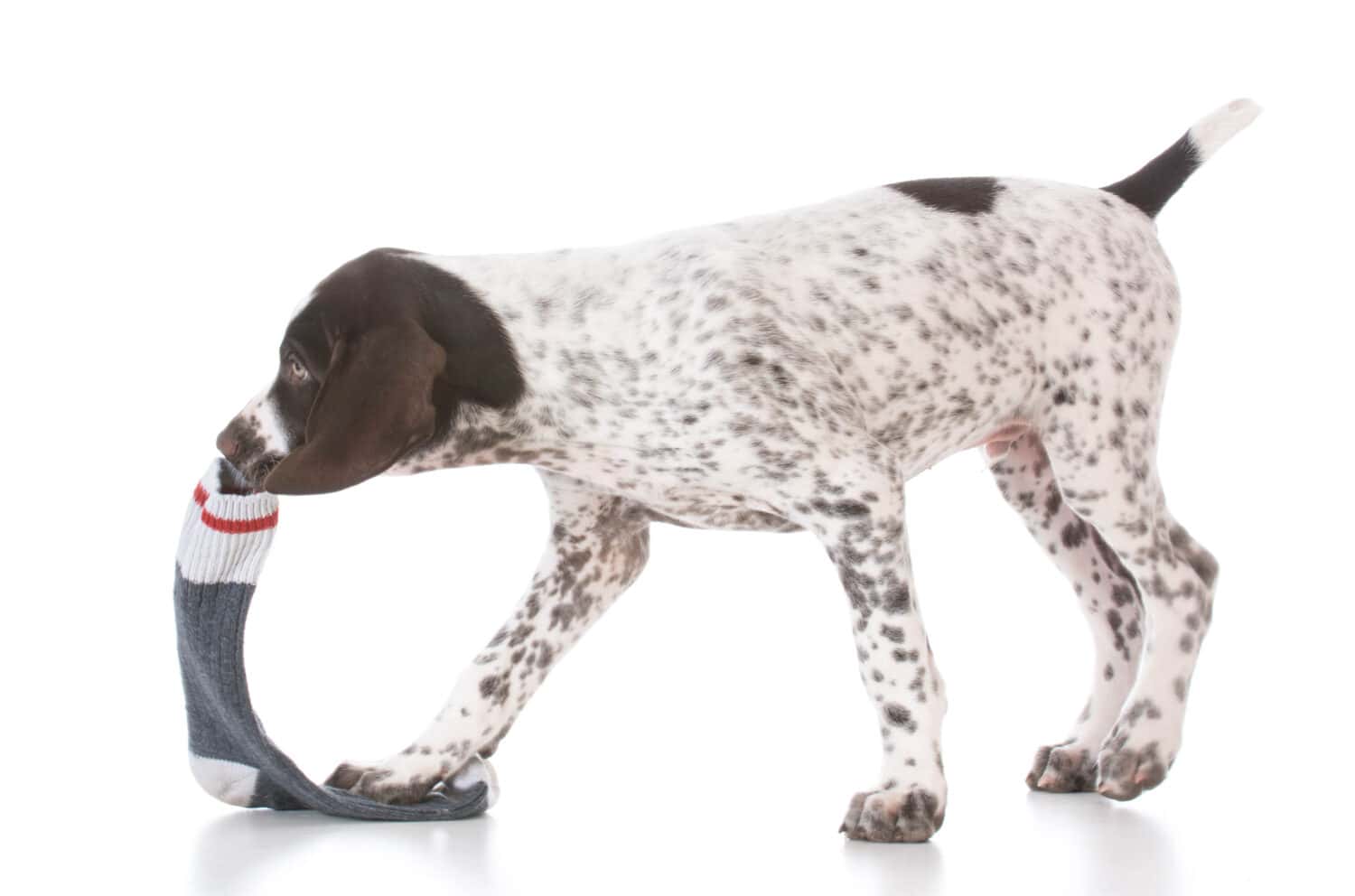
Puppy-proofing is essential with a German Shorthaired Pointer!
©WilleeCole Photography/Shutterstock.com
There are several factors that make German Shorthaired Pointers prone to destructive behaviors:
- They’re large dogs that grow quickly. You’ll see all of the normal puppy behaviors, like teething, in a bigger body than you may be used to. They may destroy bigger things in their puppyhood than other dogs.
- GSPs are very intelligent and high-energy. They get bored easily–and a bored dog is often a destructive dog.
- They’re prone to separation anxiety, which can cause destructive chewing and even trying to escape home.
- Dogs need training not to chew, and GSPs can be difficult to train without experience due to their size, prey drive, and energy levels.
The number-one way to prevent destructive chewing is to make sure you’ll have time for your dog before adopting. They need hours of daily exercise and mental enrichment, and shouldn’t be left alone for long periods (such as an entire workday).
The next steps are puppy-proofing your home to limit the things available for them to chew, and to train your dog well. An exercise pen or an entirely puppy-proofed room is good to have for when you cannot supervise your pup.
#2: They’re Big Dogs
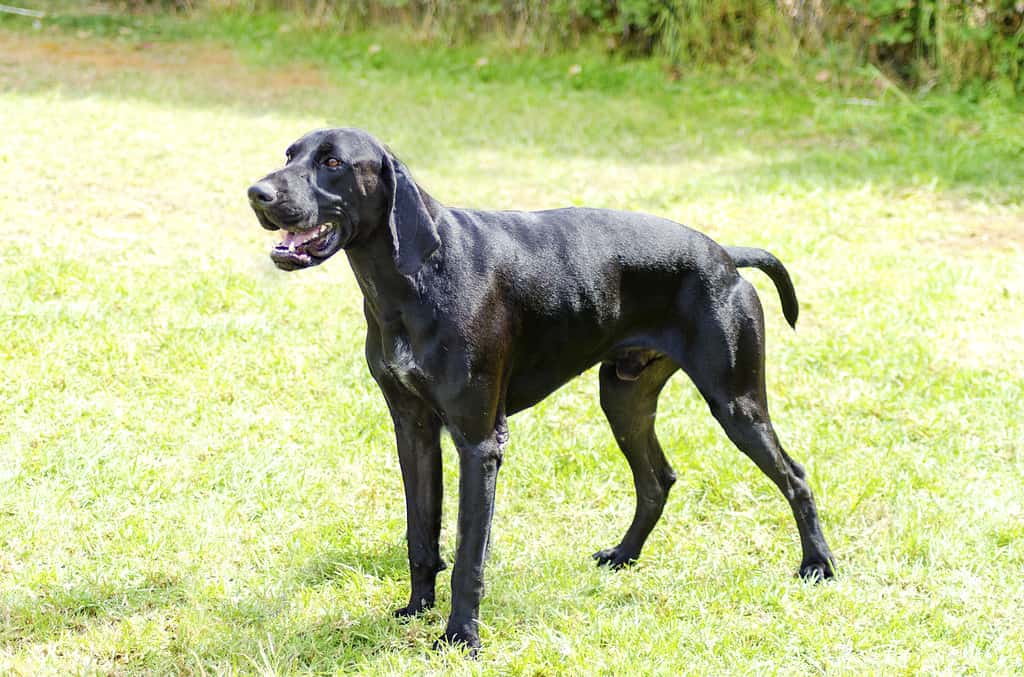
German Shorthaired Pointers stand 21-25 inches tall at the shoulders and weigh up to 70 pounds.
©f8grapher/iStock via Getty Images
Big dogs come with so many challenges compared to small ones! They’re more expensive, tug harder on their leashes, and their size can amplify any behavioral issues such as chewing or jumping.
German Shorthaired Pointers may also be more difficult to move in an emergency or if they have severe joint issues later in life.
These are all important considerations to make before adoption. But, there are also positive aspects to large dogs! They’re not as fragile as small dogs, and you’re not as likely to trip on them. They can also deter people from breaking into your home.
A silly bonus is that their heads are at just the right height. You likely won’t need to bend down to pet them!
#3: They Might Bark too Much
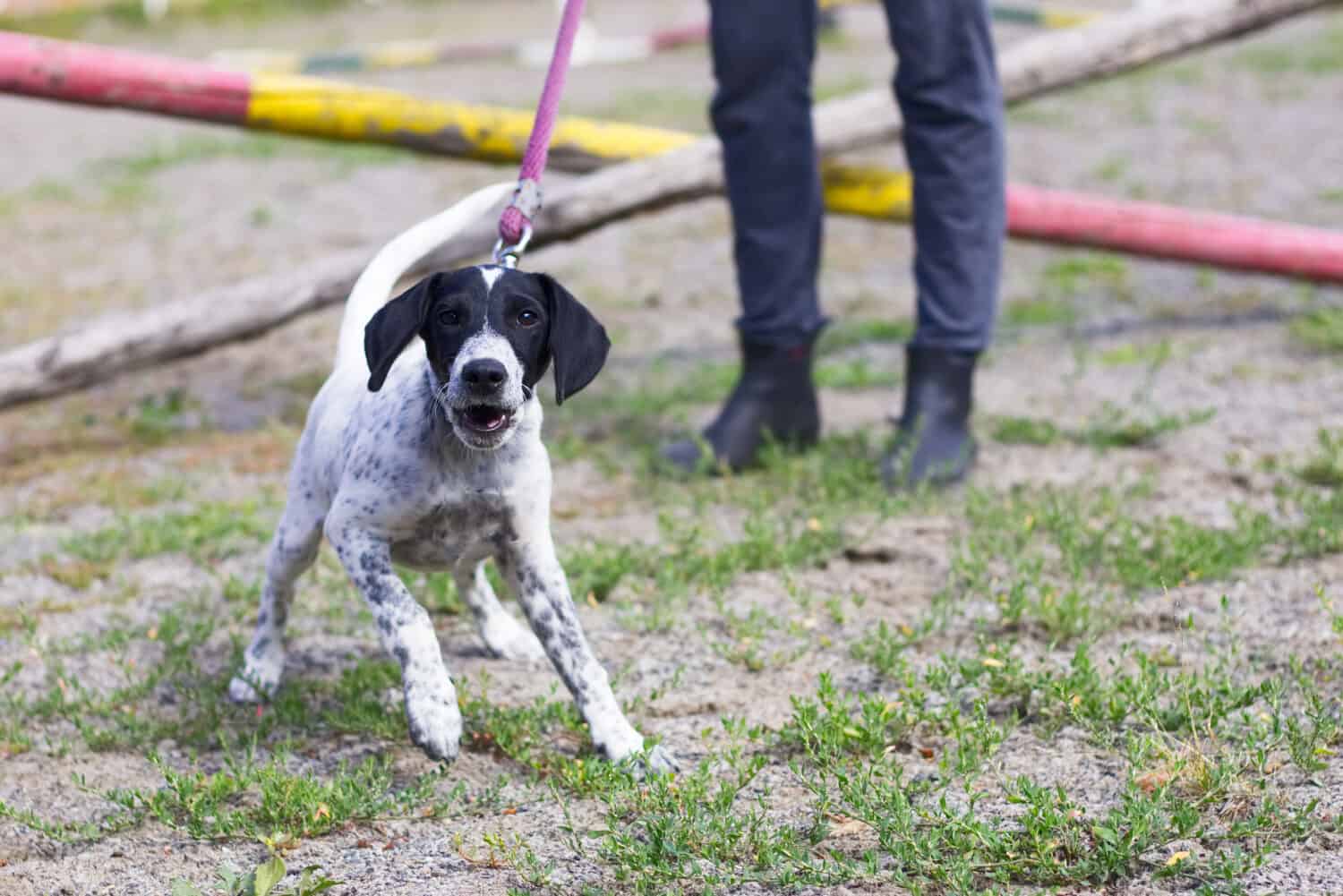
Excessive barking in the breed is usually due to a lack of exercise or enrichment.
©encierro/Shutterstock.com
Generally, German Shorthaired Pointers bark only moderately. They’ll speak up when they see a threat, but won’t yap on and on about it.
However, this changes when the dogs aren’t properly cared for. Like most problem behaviors, excessive barking is usually a result of boredom due to the dog not getting enough exercise, mental enrichment, or quality time.
It can also stem from anxiety, such as separation anxiety or reactivity.
#4: They Jump on People
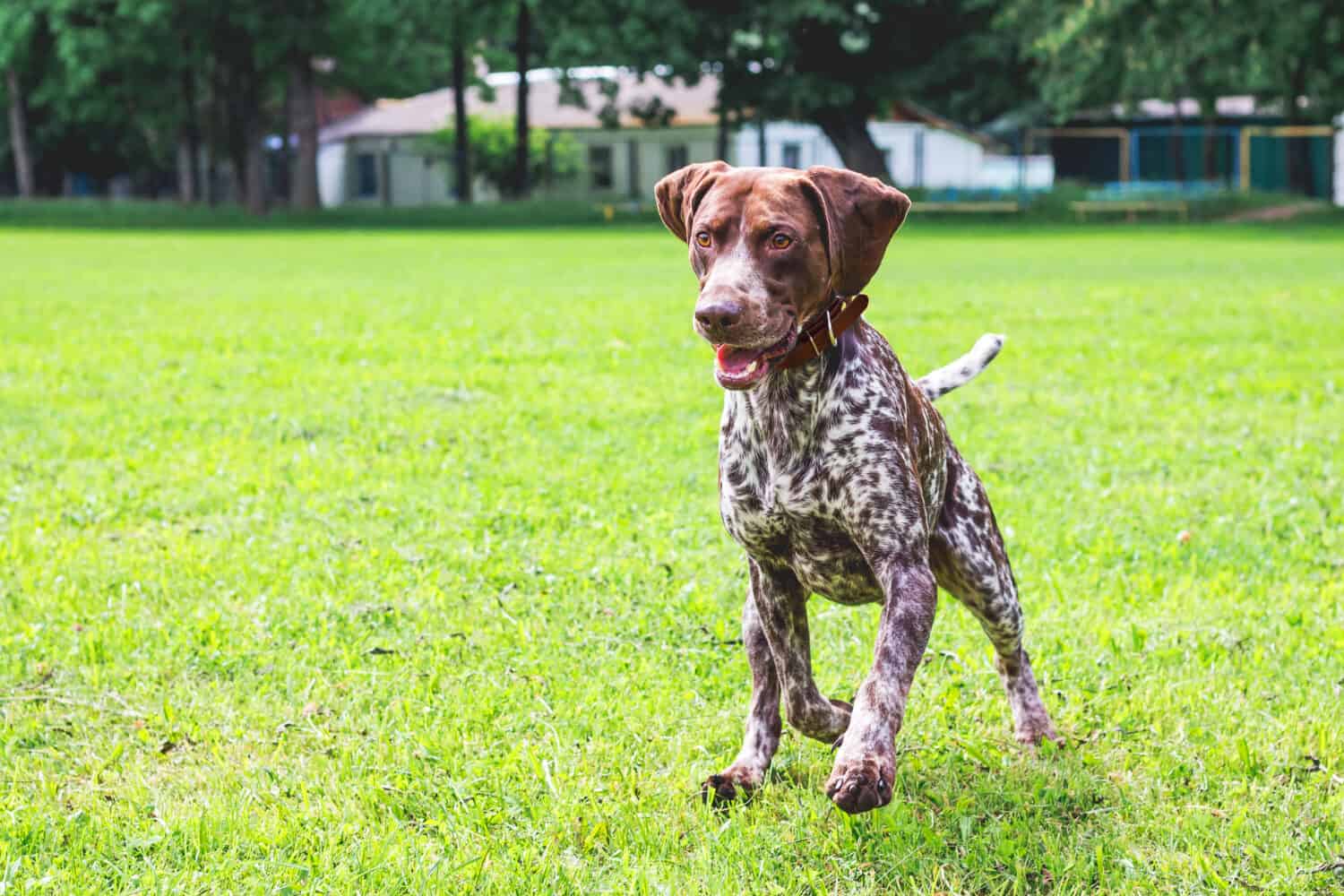
It’s important to train good manners while your puppy is young.
©MVolodymyr/Shutterstock.com
Another training issue is that your GSP may jump up on people. This is especially problematic if you have children, seniors, or disabled people living with you.
While this behavior can be trained out, you have to remember that it’s normal puppy behavior–and that GSPs can be very large puppies!
Until they know better, you’ll need to constantly manage them around people who shouldn’t be jumped on. This includes keeping them on leash so that they can’t jump, or keeping them separated using a baby gate or dog exercise pen.
If you don’t mind the jumping and don’t live with anyone who does, it’s okay to allow it–but you also need to train your dog to interact more gently with others who don’t want a dog pouncing at them.
#5: They Can be Overly Protective

German Shorthaired Pointers are protective of their people.
©New Africa/Shutterstock.com
Most people see having a protective dog as a good thing, but it does come with its challenges. You need to ensure their instincts don’t drive them to aggression in inappropriate moments.
Your dog shouldn’t be allowed to guard family members from others in the household. They also shouldn’t react fearfully to strangers out in public.
You’ll also want to take precautions against resource guarding, including never sticking your hand in your dog’s food. A great early training method is to toss small treats toward your dog while they have something valuable, like a favorite chew or toy. This teaches them not to fear you taking the object, but instead to associate your presence with positivity and treats!
#6: GSPs have Prey Drives
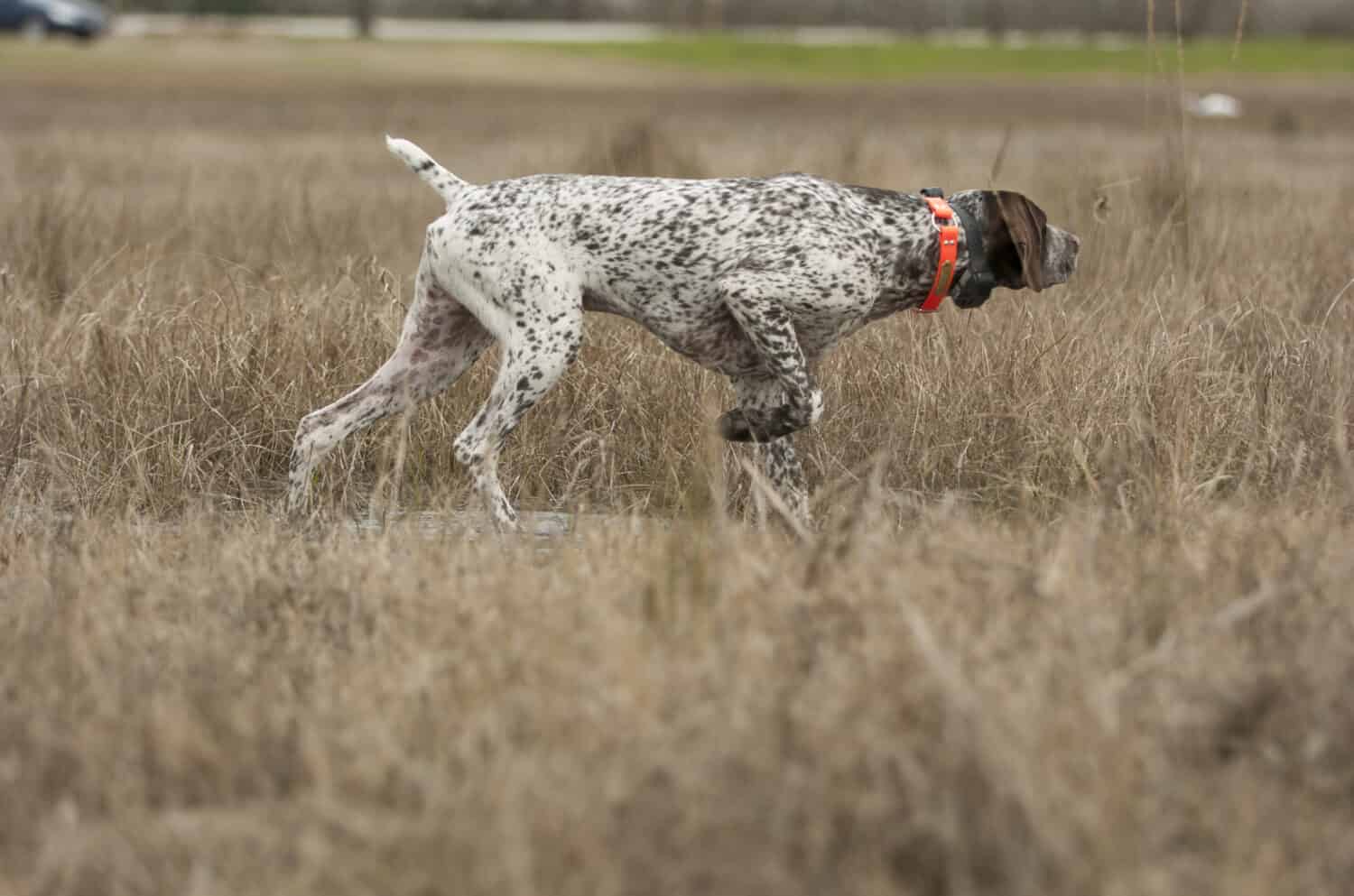
Your German Shorthaired Pointer may not get along with cats or small dogs due to their high prey drives.
©S.M/Shutterstock.com
You can’t adopt a hunting breed and expect that they’ll never try to hunt! Unfortunately, we also can’t expect them to only see certain animals as prey, or to only hunt when it’s convenient.
Your German Shorthaired Pointer’s prey drive may make it impossible for them to live with cats or small dogs. Smaller pets such as rodents should be kept separated at all times.
It’s also possible for your GSP to see prey where there isn’t any, such as a plastic bag blowing down the street. They may run off to chase the item without thinking it through, which can be dangerous.
#7: Recall can be Difficult to Teach
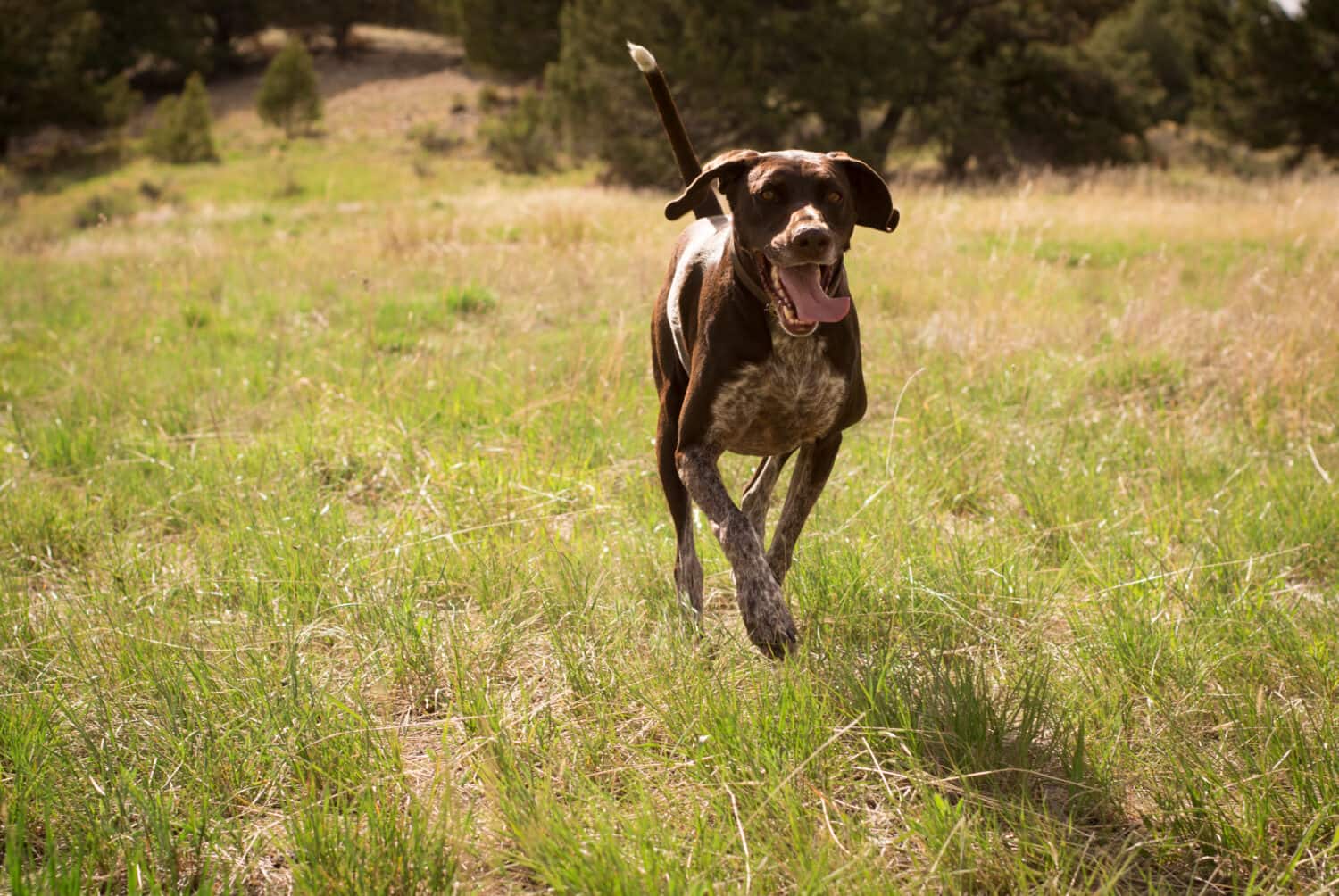
German Shorthaired Pointers are easily distracted, especially outside.
©RisingTimber/Shutterstock.com
Their strong prey drive can also make training a reliable recall difficult. Your German Shorthaired Pointer may not respond when they’re distracted trying to sniff out a squirrel or when they see a cat across the road.
Unless your dog can be trusted to return to you immediately when called, even mid-chase, they should never be allowed off-leash in an unenclosed space. It’s a huge risk, especially if you’re near busy streets or even wooded areas where it can be hard to find a dog once lost.
#8: They’re a Driven, Sporting Breed
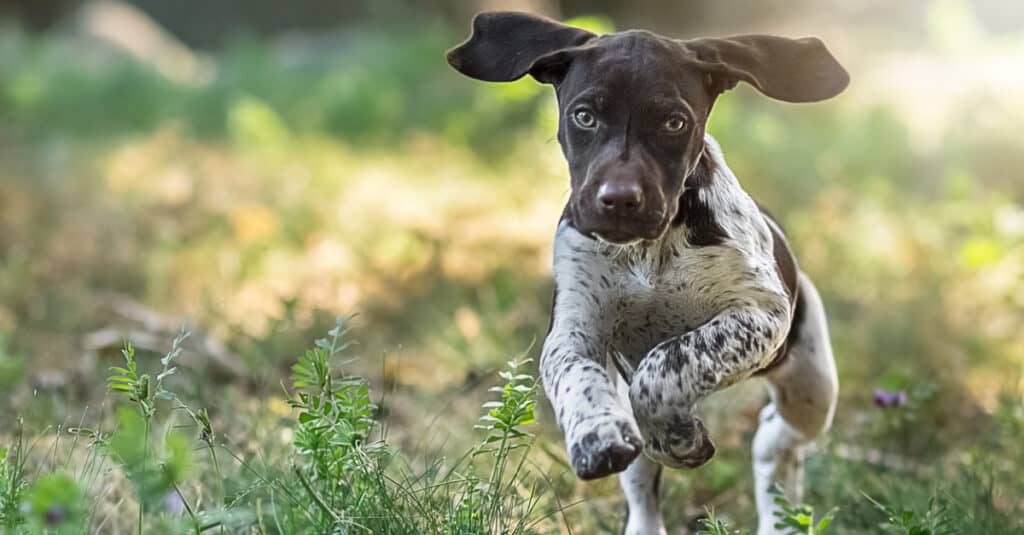
These are active dogs that need plenty of daily exercise.
©iStock.com/BeeBuddy
As we’ve already discussed, German Shorthaired Pointers can develop several behavioral problems if they don’t get enough exercise every day.
For these dogs, a short daily walk won’t be enough. They need to be able to exert themselves for at least an hour a day.
Ideally, this will include running or swimming. GSPs love having large yards where they can run and play with their people, but don’t expect them to exercise themselves–hands-on activities are required.
#9: They aren’t Apartment Dogs
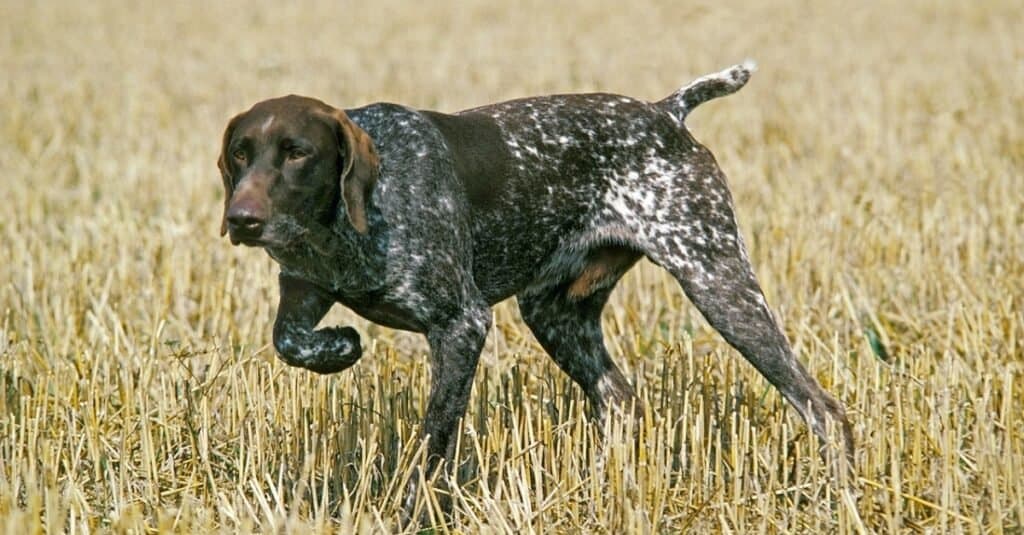
They do best when able to roam in a large, enclosed space.
©iStock.com/slowmotiongli
Most breeds can do well in apartments given enough outdoor time. But, there’s no doubt that keeping a GSP happy in an apartment is hard work!
It means going outside for potty breaks many times a day, giving them ample opportunities to stretch their legs, and finding places for them to run safely.
A house with a large, fenced backyard is ideal for these dogs and makes it easier for them to get enough exercise.
#10: Mental Enrichment is a Must
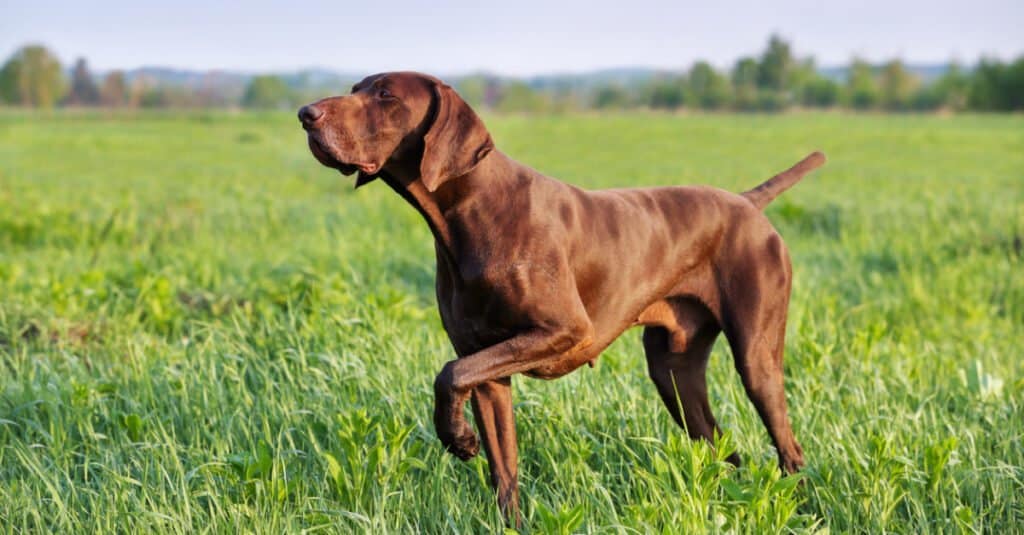
Engaging their minds is as important as physical exercise.
©Vitalii_Mamchuk/Shutterstock.com
If you only physically exercise your German Shorthaired Pointer, you’ll still have an incredibly bored dog on your hands. A common mistake is spending hours a day on exercise, and wondering why your dog never seems tired!
This is because you’re building their endurance levels, but not tiring out their minds. Mental enrichment can include training, nose work (finding hidden treats, objects, or people), or “hunting” a toy such as a flirt pole.
#11: Their Care Takes a Lot of Time

German Shorthaired Pointers need dedicated people who are willing to spend lots of time with them.
©Marian Weyo/Shutterstock.com
As you can see from the above, German Shorthaired Pointers are time-consuming pets. You’ll need to spend hours a day actively engaging with them, and that’s not including pets, snuggles, or just hanging out in the same room.
It also doesn’t include other care tasks such as feeding them, cleaning up after them, or brushing their fur.
#12: German Shorthaired Pointers Shed

Though their coats are short, they do shed plenty of fur.
©iStock.com/BranstonandTwiglet
These dogs shed moderately year-round. During the spring and autumn, your GSP will shed more heavily than usual.
You’ll need to brush their coat every few days, and daily during shedding season. Furniture covers can help to prevent the furniture from becoming covered in hair, even if you only toss down an old blanket and wash it weekly.
#13: They Can be Difficult to Train
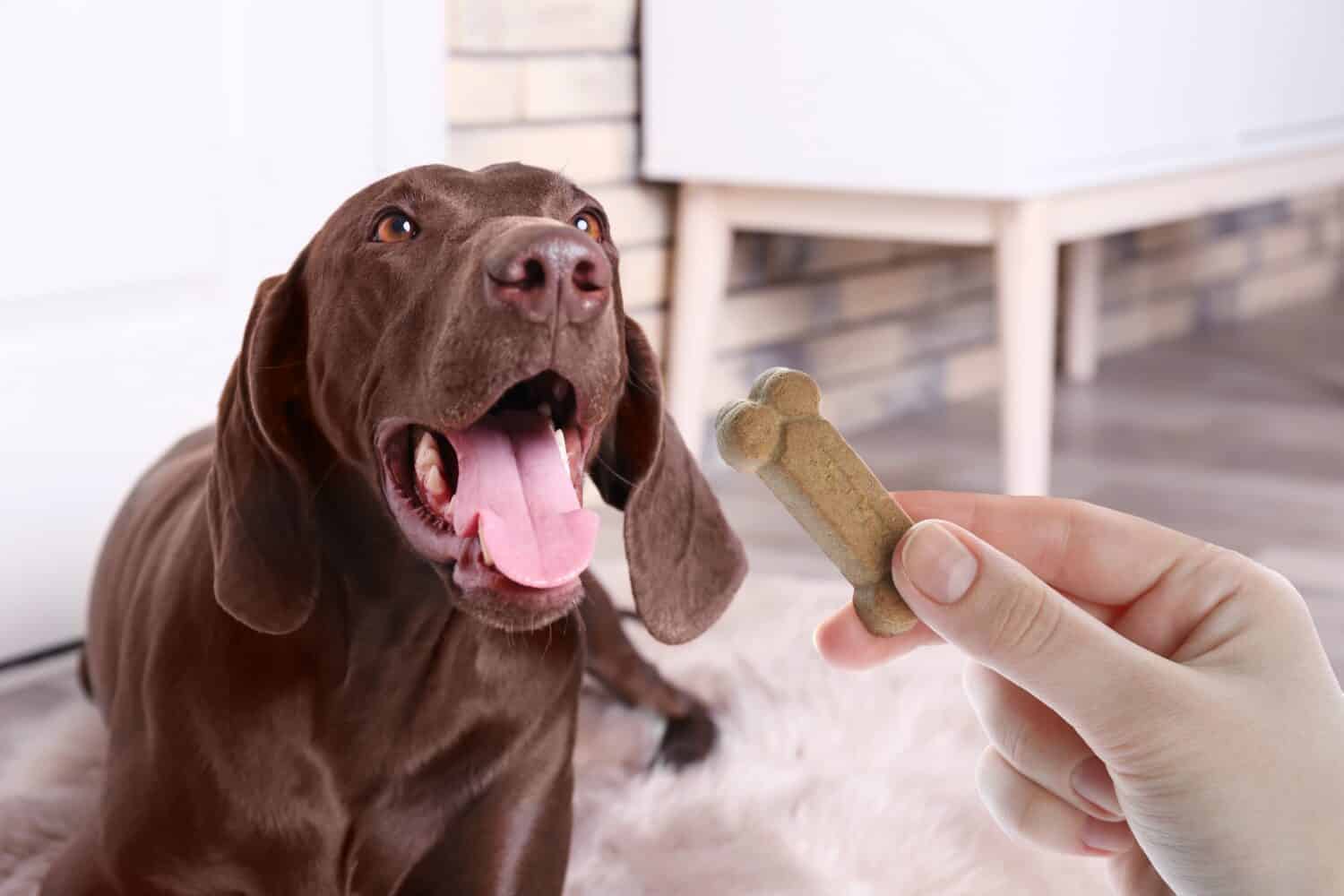
Positive reinforcement is one of the best ways to train a German Shorthaired Pointer.
©New Africa/Shutterstock.com
German Shorthaired Pointers are smart and eager to please, which makes for easier training. However, they can be difficult for people without dog training experience.
A big mistake you might make is moving too quickly with their training or skipping steps. Their prey drives can make them easily distractable, so it’s important to teach new cues indoors. Choose a low-distraction environment, even if it means removing other pets or people from the room while you work.
Once your pup knows the cue well, you can work on adding in some distractions slowly. Do so until they can listen reliably in any context.
It’s also important to avoid aversive training methods with your dog. We want training to be a fun, positive experience–essentially, we don’t want to lead by fear!
#14: They’re Sensitive to the Cold
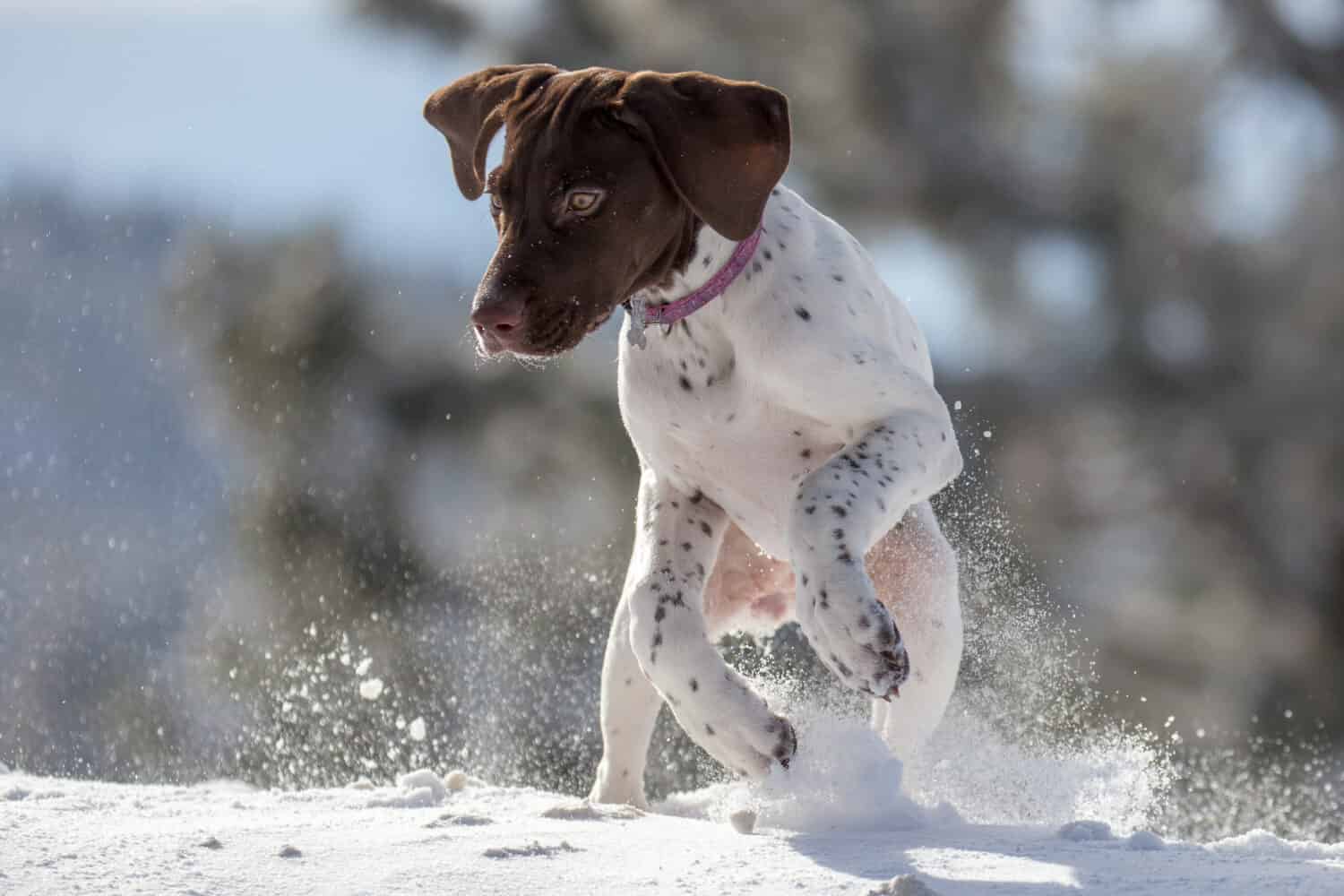
Some German Shorthaired Pointers dislike the cold.
©CSNafzger/Shutterstock.com
Since their coats are so short, German Shorthaired Pointers can be sensitive to cold weather. This can also apply to the water. Although they love to swim, GSPs should be kept out of cold waters.
Of course, temperature preferences will come down to the individual dog and where you live. You may be able to help your dog who hates the cold by buying them a coat or some winter booties!
#15: They’re Prone to Some Health Problems

German Shorthaired Pointers are prone to some genetic health problems.
©New Africa/Shutterstock.com
Like every breed, German Shorthaired Pointers are prone to specific health problems. Some things to watch for include:
- Hip dysplasia – a loose hip joint that can cause difficulty walking
- Lymphedema – a disorder of the lymph nodes that causes swelling in the legs and typically begins at a young age
- Von Willebrand’s Disease – a blood clotting disorder
- Bloat (GDV) – an emergent condition in which a dog’s stomach fills with food, liquid, or air and flips inside the body
Adopting from a reputable breeder can reduce or eliminate your dog’s chances of developing some health conditions. Please make sure both parents have up-to-date OFA health testing available for you to see before purchasing a puppy.
Thank you for reading! If you have feedback on this post, please contact the AZ Animals editorial team.
The photo featured at the top of this post is © New Africa/Shutterstock.com
Ready to discover the top 10 cutest dog breeds in the entire world?
How about the fastest dogs, the largest dogs and those that are -- quite frankly -- just the kindest dogs on the planet? Each day, AZ Animals sends out lists just like this to our thousands of email subscribers. And the best part? It's FREE. Join today by entering your email below.
Thank you for reading! Have some feedback for us? Contact the AZ Animals editorial team.







